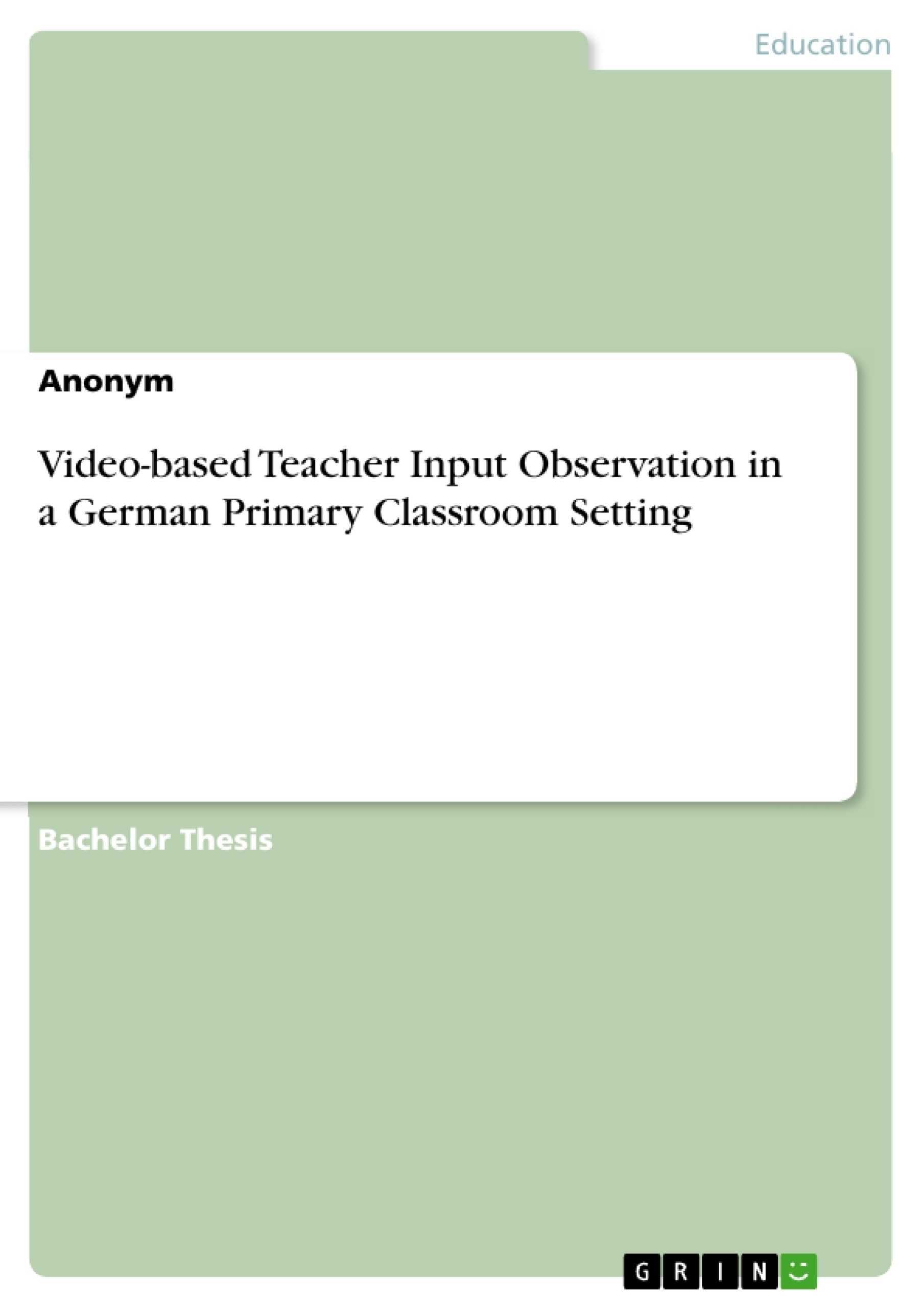
Video-based Teacher Input Observation in a German Primary Classroom Setting
Bachelorarbeit, 2019
29 Seiten, Note: 1,0
Leseprobe
Inhaltsverzeichnis (Table of Contents)
- 1. Introduction
- 2. Theoretical Background
- 2.1. Classroom Observation
- 2.2. Input Theories
- 2.2.1. Input Hypothesis
- 2.2.2. Interaction Hypothesis
- 2.2.3. Output Hypothesis
- 2.3. Input Quality
- 2.4. Videography
- 2.5. The Two Teaching Approaches: Synthetic Phonics and Whole Word
- 2.5.1. Synthetic Phonics in English-Speaking Countries and in the L2-classroom
- 2.5.2. Whole Word Approach
- 3. Empirical Study
- 3.1. Methodology
- 3.1.1. Research question, hypothesis and expected eutcome
- 3.1.2. Methodological approach
- 3.1.3. Subjects
- 3.1.4. Elicitation Procedure
- 3.1.4.1. Elicitation Instrument: Teacher Input Observation Scheme (TIOS)
- 3.1.4.2. Rating participants
- 3.1.5. Data Analysis
- 3.1.6. Methodological and Analytical Limitations
- 3.2. Research Results
- 3.2.1. Individual and Mean Percentage Scores of R1 and R2
- 3.2.2. Individual High-Inference Category Scores
- 3.2.3. Comparison of Mean High-Inference Category Scores
- 3.2.4. Statistical Significance
- 3.3. Discussion
- 3.1. Methodology
- 4. Conclusion
Zielsetzung und Themenschwerpunkte (Objectives and Key Themes)
This study aims to examine the quality of teacher input in two different teaching approaches: synthetic phonics and whole word. The research focuses on observing and analyzing the teacher’s input in a German primary school setting, using the Teacher Input Observation Scheme (TIOS). The study aims to identify differences in input quality between these approaches and contribute to the field of teacher education.
- Teacher input quality in different teaching approaches
- The role of classroom observation in teacher education
- Synthetic phonics and whole word approaches to reading literacy
- The Teacher Input Observation Scheme (TIOS) as a tool for measuring input quality
- Analysis of teacher input in a German primary school setting
Zusammenfassung der Kapitel (Chapter Summaries)
The first chapter introduces the topic of teacher input and its significance in second language acquisition. It highlights the complexity of classroom interactions and the importance of evaluating teacher input for improving teaching and learning. The chapter also outlines the structure of the thesis, dividing it into two sections: theoretical background and empirical study.
The second chapter delves into the theoretical background of classroom observation, input theories, and the concept of input quality. It defines key terms, explores relevant research, and discusses the use of videography for data collection. This chapter also provides detailed explanations of the two teaching approaches observed in the study: synthetic phonics and whole word.
The third chapter focuses on the empirical study, outlining the research question, hypothesis, and expected outcome. It describes the methodological approach, including the participants, data collection methods, and data analysis procedures. The chapter also addresses potential methodological and analytical limitations of the study.
The fourth chapter presents the research results, providing an analysis of the data gathered through the Teacher Input Observation Scheme (TIOS). It examines individual and mean percentage scores, high-inference category scores, and statistical significance.
Schlüsselwörter (Keywords)
Teacher input, classroom observation, second language acquisition, synthetic phonics, whole word, Teacher Input Observation Scheme (TIOS), input quality, primary school, German, videography.
Frequently Asked Questions
What is the Teacher Input Observation Scheme (TIOS)?
TIOS is an observation instrument developed at Hildesheim University to measure and analyze the quality of teacher input (TIQ) in classroom settings.
Which two teaching approaches were compared in this study?
The study compared the "Synthetic Phonics" approach and the "Whole Word" approach to reading literacy in an English as a second language (L2) classroom.
What is the significance of "input quality" in Second Language Acquisition?
The teacher is a major external factor; the quality of their linguistic input directly influences the success of learners in acquiring a foreign language.
Why was videography used in this research?
Videography allows for a detailed and repeatable analysis of the complex interactions between teachers, students, and content that single measurements cannot capture.
In what educational setting was the study conducted?
The study was conducted in a German primary school classroom setting, focusing on early foreign language acquisition.
Details
- Titel
- Video-based Teacher Input Observation in a German Primary Classroom Setting
- Hochschule
- Universität Hildesheim (Stiftung) (Institut für Englische Sprache und Literatur)
- Note
- 1,0
- Autor
- Anonym (Autor:in)
- Erscheinungsjahr
- 2019
- Seiten
- 29
- Katalognummer
- V512660
- ISBN (eBook)
- 9783346099396
- ISBN (Buch)
- 9783346099402
- Sprache
- Englisch
- Schlagworte
- video-based teacher input observation german primary classroom setting
- Produktsicherheit
- GRIN Publishing GmbH
- Preis (Ebook)
- US$ 16,99
- Preis (Book)
- US$ 18,99
- Arbeit zitieren
- Anonym (Autor:in), 2019, Video-based Teacher Input Observation in a German Primary Classroom Setting, München, Page::Imprint:: GRINVerlagOHG, https://www.diplomarbeiten24.de/document/512660
- Autor werden
- Ihre Optionen
- Vertriebskanäle
- Premium Services
- Autorenprofil
- Textarten und Formate
- Services für Verlage, Hochschulen, Unternehmen

- © GRIN Publishing GmbH.
- Alle Inhalte urheberrechtlich geschützt. Kopieren und verbreiten untersagt.
- info@grin.com
- AGB
- Open Publishing
Der GRIN Verlag hat sich seit 1998 auf die Veröffentlichung akademischer eBooks und Bücher spezialisiert. Der GRIN Verlag steht damit als erstes Unternehmen für User Generated Quality Content. Die Verlagsseiten GRIN.com, Hausarbeiten.de und Diplomarbeiten24 bieten für Hochschullehrer, Absolventen und Studenten die ideale Plattform, wissenschaftliche Texte wie Hausarbeiten, Referate, Bachelorarbeiten, Masterarbeiten, Diplomarbeiten, Dissertationen und wissenschaftliche Aufsätze einem breiten Publikum zu präsentieren.
Kostenfreie Veröffentlichung: Hausarbeit, Bachelorarbeit, Diplomarbeit, Dissertation, Masterarbeit, Interpretation oder Referat jetzt veröffentlichen!
- GRIN Verlag GmbH
-
- Nymphenburger Str. 86
- 80636
- Munich, Deutschland
- +49 89-550559-0
- +49 89-550559-10
- info@grin.com
-









